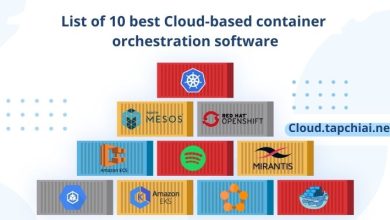Cloud Cost Management Software: Optimizing Your Cloud Expenses

The rapid growth of cloud computing has revolutionized the business landscape, enabling organizations to scale their operations seamlessly. However, as businesses embrace the cloud, managing costs becomes a critical challenge. This is where cloud cost management software comes into play. But what exactly is it, and why is it so important?
Defining Cloud Cost Management Software
Cloud cost management software refers to a powerful tool designed to help businesses monitor, optimize, and control their cloud expenses effectively. It provides comprehensive insights into cloud resource consumption, allowing organizations to identify areas of overspending and make data-driven decisions to maximize cost efficiency.
The Importance of Cloud Cost Management Software
In today’s competitive business environment, controlling costs is crucial for sustainable growth and profitability. Cloud cost management software allows businesses to gain a clear understanding of their cloud spending patterns, enabling them to take proactive measures to minimize unnecessary expenses. By optimizing cloud costs, organizations can allocate their resources more efficiently, invest in innovation, and stay ahead of the competition.
Benefits of Cloud Cost Management Software
Implementing a robust cloud cost management software offers numerous benefits to businesses. Firstly, it provides real-time visibility into cloud expenditures, allowing organizations to track costs at granular levels and identify cost-saving opportunities. Secondly, it offers budgeting and forecasting capabilities, empowering businesses to plan their cloud expenses effectively. Moreover, it enables proactive cost optimization by identifying idle resources, right-sizing instances, and leveraging reserved instances or savings plans.
Relevance in the Modern Business Landscape
With the increasing adoption of cloud services, cloud cost management software has become an indispensable tool for organizations of all sizes. It helps businesses keep their cloud expenditures in check, ensuring they get the most value from their cloud investments. Additionally, it empowers finance and IT teams to collaborate effectively, aligning cloud spending with business goals and enhancing overall operational efficiency.
In the following sections, we’ll delve deeper into the key features, factors to consider, top solutions, implementation best practices, and future trends in cloud cost management software. Stay tuned to discover how you can unlock the full potential of your cloud infrastructure while optimizing costs.
Contents
Understanding Cloud Cost Management Software

Cloud cost management software offers a comprehensive set of features and functionalities that enable businesses to effectively optimize their cloud expenses and improve cost efficiency. Let’s delve deeper into its key aspects:
Key Features of Cloud Cost Management Software
Cloud cost management software provides a range of features designed to analyze, monitor, and control cloud expenditures. Here are some key features to look out for:
1. Cost Visibility: This software offers detailed insights into cloud spending, allowing businesses to track costs across various cloud providers, services, and regions. It provides real-time visibility into resource utilization, helping organizations identify areas of overspending.
2. Cost Allocation: Cloud cost management software enables businesses to allocate cloud costs accurately. It helps in mapping costs to specific departments, projects, or teams, enabling effective cost attribution and budgeting.
3. Cost Optimization: This feature helps organizations identify potential cost-saving opportunities. It analyzes resource utilization and recommends actions such as rightsizing instances, utilizing reserved instances or savings plans, and identifying idle resources.
4. Budgeting and Forecasting: Cloud cost management software empowers businesses to set budgets and forecasts for their cloud expenses. It provides alerts and notifications when costs exceed predefined thresholds, enabling proactive cost control.
How Cloud Cost Management Software Benefits Businesses
Implementing cloud cost management software has several significant advantages for businesses:
1. Enhanced Cost Control: By leveraging the insights provided by the software, organizations can actively monitor and control their cloud expenses. They can identify areas of overspending and take immediate corrective actions, resulting in cost savings.
2. Improved Cost Efficiency: Cloud cost management software helps optimize cloud spending by identifying underutilized resources and recommending cost-saving measures. This leads to improved cost efficiency and ensures that businesses get the maximum value from their cloud investments.
3. Streamlined Financial Management: By accurately allocating and attributing cloud costs, businesses can streamline their financial management processes. This enables better financial planning, facilitates chargebacks or showbacks, and enhances overall budget management.
4. Data-Driven Decision Making: Cloud cost management software provides businesses with a wealth of data and insights. Organizations can leverage this information to make data-driven decisions regarding resource allocation, capacity planning, and cost optimization.
In the next sections, we will explore the factors to consider while choosing cloud cost management software, highlight some of the top solutions in the market, delve into implementation best practices, and discuss the future trends in cloud cost management software. Stay tuned to uncover the secrets of successful cloud cost management!
Key Factors to Consider while Choosing Cloud Cost Management Software
When selecting the right cloud cost management software for your business, there are several crucial factors to consider. By carefully evaluating these factors, you can ensure that the software aligns with your organization’s specific needs and goals. Let’s explore the key considerations to keep in mind:
1. Scalability
Scalability is a vital factor to consider when choosing cloud cost management software. As your business grows, your cloud infrastructure will likely expand, and the software should be able to accommodate this growth seamlessly. Look for a solution that can handle the increasing complexity and volume of your cloud resources while maintaining high performance and efficiency.
2. Integration Capabilities
Efficient integration with your existing cloud infrastructure and management tools is essential for a smooth and streamlined experience. Ensure that the cloud cost management software can seamlessly integrate with your chosen cloud service providers, such as AWS, Azure, or Google Cloud. This integration will enable comprehensive visibility and accurate cost analysis across all your cloud resources.
3. User-Friendliness
A user-friendly interface is crucial to ensure that your team can effectively utilize the cloud cost management software. Look for a solution that provides intuitive dashboards, clear visualizations, and easy-to-understand reports. The software should empower your finance and IT teams to navigate through data effortlessly, make informed decisions, and take timely cost optimization actions.
4. Cost-Effectiveness
While the primary goal of implementing cloud cost management software is to optimize expenses, it’s also essential to consider the cost-effectiveness of the software itself. Evaluate the pricing models offered by different vendors and consider the value you will gain from their features. Look for a solution that offers flexible pricing options, aligning with your budget and scaling requirements.
By carefully assessing these factors, you can select a cloud cost management software that best fits your organization’s unique needs. Remember, scalability, integration capabilities, user-friendliness, and cost-effectiveness are critical considerations that will contribute to the success of your cloud cost optimization efforts. Next, we will explore some of the top cloud cost management software solutions available in the market.
Best Practices for Implementing Cloud Cost Management Software
Strategies for Successful Implementation
Implementing cloud cost management software requires careful planning and execution. Here are some effective strategies to ensure a smooth and successful implementation:
-
Define Clear Objectives: Clearly outline your goals and objectives for implementing cloud cost management software. Whether it’s reducing overall cloud expenses, optimizing resource allocation, or improving cost visibility, having well-defined objectives will guide your implementation process.
-
Choose the Right Solution: Research and select a cloud cost management software solution that aligns with your specific needs and requirements. Consider factors such as scalability, integration capabilities, user-friendliness, and cost-effectiveness to ensure the chosen solution meets your organization’s unique challenges.
-
Establish Cross-Functional Collaboration: Involve stakeholders from finance, IT, and other relevant departments to ensure collaboration and buy-in throughout the implementation process. This cross-functional approach will help align cloud spending with business goals and foster a culture of cost optimization.
Importance of Proper Training, Data Analysis, and Ongoing Optimization
-
Invest in Training: Provide comprehensive training to your teams on how to effectively use the cloud cost management software. This will empower them to leverage the software’s features and functionalities to their full potential, enabling better decision-making and cost optimization.
-
Data Analysis for Insights: Regularly analyze the data generated by the software to gain valuable insights into your cloud spending patterns. Identify areas of overspending, underutilized resources, and potential cost-saving opportunities. Use these insights to drive informed decisions and make adjustments to your cloud infrastructure.
-
Continuous Optimization: Cloud cost management is an ongoing process. Continuously monitor and optimize your cloud expenses based on changing business needs and market dynamics. Regularly review your cloud architecture, leverage automation, and explore new cost-saving features offered by your cloud service provider.
By following these best practices, you can maximize the benefits of your cloud cost management software and drive significant cost savings, while ensuring your cloud infrastructure remains aligned with your organizational goals. In the next section, we will explore the future trends in cloud cost management software. Stay tuned to stay ahead in the dynamic cloud landscape.
Conclusion
In today’s fast-paced digital landscape, cloud cost management software has become a vital tool for businesses seeking to optimize their cloud expenses. By implementing a robust solution, organizations can gain valuable insights into their cloud spending patterns, identify cost-saving opportunities, and maximize their return on investment.
Cloud cost management software offers a myriad of benefits, including real-time visibility into cloud expenditures, budgeting and forecasting capabilities, and proactive cost optimization features. With the ability to track costs at granular levels, businesses can make informed decisions, eliminate wasteful spending, and strategically allocate their resources.
As the demand for cloud services continues to grow, it is essential for businesses to choose the right cloud cost management software solution. There are several leading options available in the market, each with its unique features, pricing models, and customer reviews. It is crucial to conduct thorough research, consider factors such as scalability, integration capabilities, user-friendliness, and cost-effectiveness, before making a decision.
Implementing cloud cost management software requires proper planning and best practices. Organizations should focus on training their teams, analyzing data, and continuously optimizing their cloud expenses. By following these best practices, businesses can ensure a successful implementation and derive the maximum benefit from their chosen software solution.
Looking ahead, the future of cloud cost management software holds exciting possibilities. With advancements in AI, machine learning, and automation, businesses can expect even more sophisticated tools to optimize their cloud costs. These innovations will further enhance the accuracy and efficiency of cost management processes, enabling organizations to stay ahead of the curve and drive business growth.
In conclusion, cloud cost management software is a game-changer for businesses operating in the cloud environment. By leveraging these tools, organizations can gain better control over their cloud expenses, streamline operations, and unlock the full potential of their cloud investments. To make the most of this technology, businesses should carefully evaluate their options, choose the right software solution, and implement best practices to ensure long-term success.
Cloud.tapchiai.net is your trusted partner in navigating the world of cloud cost management. With our comprehensive solutions and expertise, we can help you effectively manage your cloud expenses and optimize your business operations. Contact us today to learn more about how we can support your cloud cost management needs.
Conclusion: So above is the Cloud Cost Management Software: Optimizing Your Cloud Expenses article. Hopefully with this article you can help you in life, always follow and read our good articles on the website: Cloud.tapchiai.net




